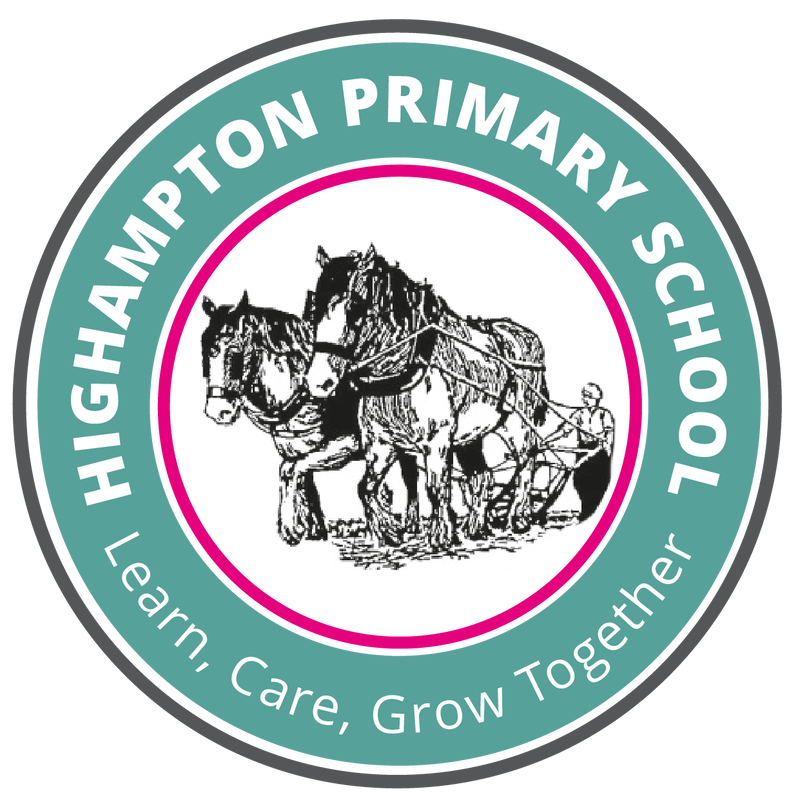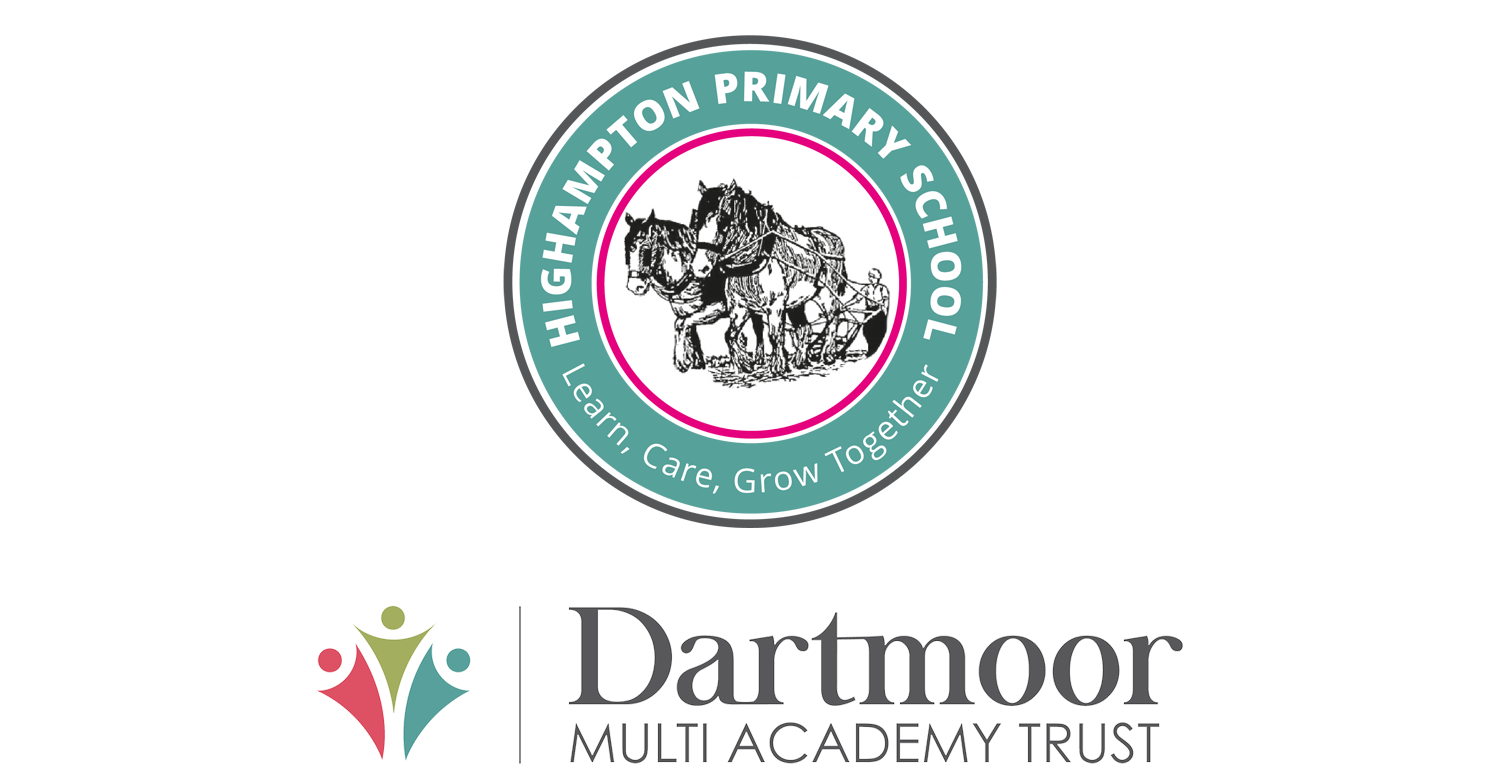Home Learning
Anchor Element
Copy for linking on the same page:
https://www.highampton-primary.devon.sch.uk/learning-hub.html?data-scroll-to-anchor=HomeLearning
Copy for linking from an external page:
https://www.highampton-primary.devon.sch.uk/learning-hub.html?data-anchor-link=HomeLearning
Curriculum
At Highampton Primary, we have created a curriculum, which aims to develop the whole child; to build the skills and confidence to become a valuable member of the community and wider world and to own the tools to tackle life’s challenges with a smile.
The school offers a wide ranging curriculum that incorporates all aspects of the National Curriculum at Key Stages One and Two and the Foundation Stage. We are also able to provide educational visits to support and enrich learning; visits to school by local artists and theatre groups, sporting fixtures, community projects and residential visits for the older children.
If you have any questions or would like to know more about our curriculum, please ask your child's class teacher or contact our Principal on email: [email protected].
Anchor Element
Copy for linking on the same page:
https://www.highampton-primary.devon.sch.uk/learning-hub.html?data-scroll-to-anchor=Cur
Copy for linking from an external page:
https://www.highampton-primary.devon.sch.uk/learning-hub.html?data-anchor-link=Cur
National Curriculum
Early Years Foundation Stage
Transition into the school for EYFS children is thorough due to the strong links with our pre-school that is adjacent to our school site. Children in Nursery and Reception follow the Early Years Foundation Stage Curriculum. This learning challenges children and encourages them to develop into independent, motivated learners and thinkers, full of curiosity about the world around them within a fun, happy and secure environment.
The Early Years Foundation Stage curriculum is based on the following seven areas of learning:
Curriculum Overview: Foundation
The Early Years Foundation Stage curriculum is based on the following seven areas of learning:
- Communication and Language
- Personal, Social and Emotional Development
- Physical Development
- Maths
- Literacy
- Understanding of the World
- Expressive Arts and Design
Curriculum Overview: Foundation
Art and Design
Early Learning Goals
The development of children should be expected to have been attained by the end of the EYFS and is defined by early learning goals (ELGs). They should not be used as a curriculum or in any way limit the wide variety of rich experiences that are crucial to child development.
Expressive Arts & Design
The development of children’s artistic and cultural awareness supports their imagination and creativity. It is important that children have regular opportunities to engage with the arts, enabling them to explore and play with a wide range of media and materials. The quality and variety of what children see, hear and participate in is crucial for developing their understanding, self-expression, vocabulary and ability to communicate through the arts. The frequency, repetition and depth of their experiences are fundamental to their progress in interpreting and appreciating what they hear, respond to and observe.
Computing
At Highampton Primary School, we believe in giving children the skills needed for the 21st Century – computing is a key component of this. Our curriculum is designed to give our learners the skills and knowledge needed to access computing technology. The computing curriculum is designed to build upon knowledge and skills with technology with a strong thread of online safety. At all times the skills and knowledge practiced will be linked to contextualised applications with links to science, maths and other curriculum areas.
Physical Education
At Highampton Primary School, we recognise the importance of PE and the role it has to play in promoting long term, healthy lifestyles. The intent of our PE curriculum is to provide all children with high quality PE and sport provision. It is our vision for every pupil to succeed and achieve their potential as well as to lead physically active lifestyles. We strive to inspire our pupils through fun and engaging PE lessons that are enjoyable, challenging and accessible to all. We want our pupils to appreciate the benefits of a healthy and physically active lifestyle. Through our teaching of PE, we will provide opportunities for pupils to develop values and transferrable life skills such as fairness and respect as well as providing them with opportunities to take part in competitive sport.
We use the ‘Real PE’ scheme of work to support and improve our planning and lessons.
We use the ‘Real PE’ scheme of work to support and improve our planning and lessons.
History
Our History curriculum includes termly topics for all children from Year 1 to Year 6. We aim to offer a high-quality history education that will help pupils gain a coherent knowledge and understanding of Britain’s past and that of the wider world. It should inspire pupils’ curiosity to know more about the past. Teaching should equip pupils to ask perceptive questions, think critically, weigh evidence, sift arguments, and develop perspective and judgement. History helps pupils to understand the complexity of people’s lives, the process of change, the diversity of societies and relationships between different groups. It also helps children gain a sense of their own identity within a social, political, cultural and economic background. Because of this, we feel it is important for the subject to be taught discretely as well as incorporated within other curriculum subjects such as English and Art.
Key Stage 1
Children are still working on the Early Learning Goals of the Early Years Foundation Stage Curriculum as they enter Year 1. There is a period in the Autumn Term where the majority of children progress to the KS1 National Curriculum. Throughout this period and beyond all children continue to develop their Phonic knowledge through the Letters and Sounds and Jolly Phonics programmes and their fluency in reading through a banded reading Scheme and Rethink Reading strategies.
The National Curriculum is delivered using an integrated topic approach and assessed using National Curriculum statements as a basis to ensure coverage and progression throughout the school. The more-able are extend to greater depth in their learning and children who find aspects of their learning more challenging are appropriately supported, so that they too are enabled to experience success.
The National Curriculum is delivered using an integrated topic approach and assessed using National Curriculum statements as a basis to ensure coverage and progression throughout the school. The more-able are extend to greater depth in their learning and children who find aspects of their learning more challenging are appropriately supported, so that they too are enabled to experience success.
Geography
Geography is a key skill for life and our curriculum is designed to build the knowledge and skills children need to know about their local area, their country and the wider world. We aim to widen children’s horizon to other parts of the country and world that they may not otherwise be aware of. Key skills of map reading, and compass skills are built upon throughout the school.
Music
At Highampton, the intention is that children gain a firm understanding of what music is through listening, singing, playing, evaluating, analysing, and composing across a wide variety of historical periods, styles, traditions, and musical genres. Our objective is to develop a curiosity for the subject, as well as an understanding and acceptance of the validity and importance of all types of music, and an unbiased respect for the role that music may wish to be expressed in any person’s life. We are committed to ensuring children understand the value and importance of music in the wider community, and are able to use their musical skills, knowledge, and experiences to involve themselves in music, in a variety of different contexts. We use Music specialist teachers to teach progression and skills as well as platforms such as ‘Charanga’ and ‘The Voices Foundation’ to implement these skills. We are in partnership with the Devon Music Hub for instrument loan and Music development.
English
The school uses high quality texts to teach writing with valuable vocabulary, grammar and writing styles to provide a good model for pupils’ writing. Children are encouraged to be ambitious writers, make adventurous word choices and build an interesting and engaging text. Daily guided reading sessions in conjunction with reading at home encourage a love and enjoyment of books and reading. Using ‘Re-think reading’ resources each class has a strong guided reading programme whilst using class texts for pupil enjoyment. Children learn to become confident, articulate and clear public speakers through a range of performances and events.
Maths
Mathematics is delivered through a Mastery curriculum framework developed by consultants within the Local Authority and supported by the White Rose Scheme of Work. Children are provided daily opportunities to build on key knowledge and facts and develop their fluency, reasoning, investigative and problem solving skills.
This document outlines the progression of different calculation strategies that could be taught and used from Reception to Year 6:
This document outlines the progression of different calculation strategies that could be taught and used from Reception to Year 6:
Science
A high-quality science education provides the foundations for understanding the world through the specific disciplines of biology, chemistry and physics. Science has changed our lives and is vital to the world’s future prosperity, and all children should be taught essential aspects of the knowledge, methods, processes and uses of science. Through building up a body of key foundational knowledge and concepts, children should be encouraged to recognise the power of rational explanation and develop a sense of excitement and curiosity about natural phenomena. They should be encouraged to understand how science can be used to explain what is occurring, predict how things will behave, and analyse causes.
Highampton follows the National Curriculum for science and aims to ensure that all children:
Highampton follows the National Curriculum for science and aims to ensure that all children:
- Develop scientific knowledge and conceptual understanding through the specific disciplines of biology, chemistry and physics.
- Develop understanding of the nature, processes and methods of science through different types of science enquiries that help them to answer scientific questions about the world around them.
- Are equipped with the scientific knowledge required to understand the uses and implications of science, today and for the future.
Enrichment and Extra-Curricular Activities
Highampton Primary School believes in the strength of working together, whether this is through community relations or through collaboration with other schools across the Trust. Theme weeks, whole school activities and overnight residential trips enrich and develop the children’s learning and build a sense of belonging to a community.
Each half term a visitor or event will take place, linked to the learning. The PTFA also provide trips and resources to enhance the curriculum and the enjoyment of the children at the school.
Our children take part in a range of extra-curricular activities - cooking, sports, gardening, photography and art clubs are run at various times of the year. Residential visits are aimed at Key Stage 2 children.
Each half term a visitor or event will take place, linked to the learning. The PTFA also provide trips and resources to enhance the curriculum and the enjoyment of the children at the school.
Our children take part in a range of extra-curricular activities - cooking, sports, gardening, photography and art clubs are run at various times of the year. Residential visits are aimed at Key Stage 2 children.
Residentials
Residentials are run with the other Dartmoor Federation primary schools. Children are offered an outward bound residential for Year 4 and 5 and a separate year 6 residential.
Music
The school also offers opportunities for the children to learn a musical instrument by arrangement with visiting music teachers. Miss Baldon is a music specialist. This term she is looking at teaching recorders and liaising with the Holsworthy Music Hub.
OCRA PE
The children attend a variety of sporting festivals throughout the year within the Okehampton Learning Community organised by OCRA. There is also an after school Sports Club. The children also take part in netball matches with the Holsworthy League. We have a specialist dance teacher to teach a session of dance and performance during the year.
Trips
A variety of trips take place throughout the year, some are funded by the PTFA. Trips are aimed to link with the topic learning.
Visit our Parent/Carers section of the website to find out more info:
Residentials are run with the other Dartmoor Federation primary schools. Children are offered an outward bound residential for Year 4 and 5 and a separate year 6 residential.
Music
The school also offers opportunities for the children to learn a musical instrument by arrangement with visiting music teachers. Miss Baldon is a music specialist. This term she is looking at teaching recorders and liaising with the Holsworthy Music Hub.
OCRA PE
The children attend a variety of sporting festivals throughout the year within the Okehampton Learning Community organised by OCRA. There is also an after school Sports Club. The children also take part in netball matches with the Holsworthy League. We have a specialist dance teacher to teach a session of dance and performance during the year.
Trips
A variety of trips take place throughout the year, some are funded by the PTFA. Trips are aimed to link with the topic learning.
Visit our Parent/Carers section of the website to find out more info:
Section divider type: wavesOpacity --
position: bottom








